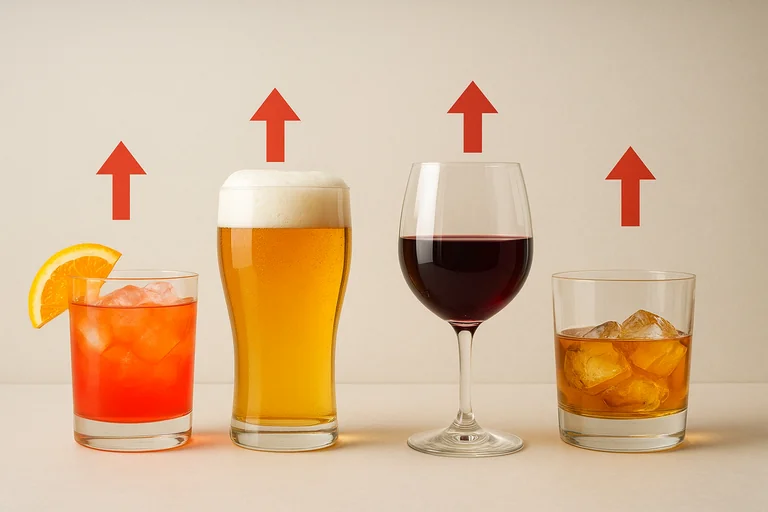A 2 minute assessment to get a personalized mental health or alcohol recovery plan.
It's a question that echoes in the minds of many: "What would my life be like if I stopped drinking?" The answer is a profound journey of transformation, a story of your body and mind healing in ways you might not have thought possible. From the very first day, a remarkable series of changes begins to unfold.
What You'll Discover:
- What to expect during the first hours, days, weeks, and months after stopping alcohol
- Steps to take to safely navigate withdrawal symptoms and maximize healing benefits
- The importance of understanding the complete timeline of physical and mental recovery
The idea of stopping alcohol and seeing dramatic improvements may seem too good to be true to some people, but it's actually been documented through extensive medical research for decades. When traditional expectations about gradual improvement fail to capture the scope of change, causing people to underestimate recovery benefits, many people assume the healing process takes years to show meaningful results. With modern understanding of liver regeneration, neuroplasticity and other rapid recovery processes now available, it's actually very straightforward to experience significant health improvements within days and weeks of stopping alcohol.
So, how does the recovery timeline work exactly? It's actually much more rapid and comprehensive than you think with multiple body systems healing simultaneously.
Do Your Research About Alcohol Recovery Timeline
Before you begin taking steps to stop drinking, it's important to learn about the predictable timeline of physical and mental improvements that occur during recovery. In particular you want to look up information on:
- How quickly your liver, brain, and other organs begin healing when alcohol is removed
- What chronic alcohol consumption does to disrupt normal body functions
- Why medical supervision is crucial during withdrawal to ensure safety
Medical recovery follows predictable patterns, and alcohol cessation is the perfect example. It's not just for people with severe alcohol use disorder who need intensive treatment. It's also appropriate for people who want to understand what improvements they can expect from reducing or eliminating regular alcohol consumption.
No matter what your current drinking level, it's always best to know as much as you can about the recovery timeline before making changes to your alcohol use.
Choose to Plan Your Recovery Safely
The next part takes medical planning as well. You'll need to understand the difference between safe, medically supervised cessation and potentially dangerous unsupervised withdrawal attempts. This is an extremely important distinction that goes well beyond just deciding to stop drinking.
You'll want to make sure that you understand the signs of dangerous withdrawal complications to ensure you get appropriate medical support when needed. Experience with alcohol recovery is also extremely important. Healthcare providers who have been managing alcohol cessation for years and specialize in addiction medicine are going to be well-equipped to help with safe withdrawal protocols.
Take an Assessment of Your Withdrawal Risk
The medical approach you choose should evaluate your specific risk factors to determine what level of supervision will be needed during your cessation process. This is a crucial part of the process for understanding whether you can stop safely on your own or need medical monitoring.
This assessment is a simple yet crucial part of the process for determining what type of support will be most appropriate for your safety during withdrawal. It also provides healthcare providers with baseline information that will be important in subsequent steps of the recovery process.
Choose the Right Recovery Support Plan
If significant risk factors are identified after assessment you can develop a medically supervised plan that maximizes both safety and healing benefits. With evidence-based recovery approaches there are several proven strategies that all include different levels of medical support and symptom management.
Have Your Recovery Planning Consultation
The most essential step in safely stopping alcohol is working with healthcare providers who understand both the risks and benefits of alcohol cessation. They will:
- Assess your withdrawal risk based on drinking history and health status
- Develop a timeline for safe cessation that minimizes dangerous complications
- Explain what improvements you can expect and when they typically occur
This will help ensure you experience the full benefits of recovery while avoiding the potentially life-threatening complications of unsupervised withdrawal. The healthcare team will provide detailed information on what to expect during each phase of recovery.
Begin Your Medically Supported Recovery
After your consultation, you'll start following the recovery plan designed to keep you safe while maximizing the healing benefits of alcohol cessation. This includes withdrawal management, nutritional support, and monitoring protocols depending on your specific situation.
The plan focuses on supporting your body's natural healing processes while preventing dangerous complications. It's extremely important to follow medical recommendations exactly as prescribed, especially when it comes to medication schedules and monitoring requirements.
Take the Recovery Timeline Seriously
Once you understand what improvements to expect and when you can begin tracking your progress through the predictable phases of healing. There will be specific milestones to watch for in sleep quality, energy levels, mental clarity, and physical health.
It's extremely important to follow the complete recovery protocol exactly as recommended, particularly when it comes to nutrition, hydration, and follow-up appointments that support optimal healing.
Follow-Up to Maximize Long-Term Benefits
Having ongoing monitoring throughout your recovery process is highly beneficial in ensuring you experience the full scope of improvements and maintain your progress long-term. It gives you the opportunity to address any challenges and optimize your recovery experience.
The healthcare team can also help you transition to maintenance strategies that protect and build upon the health gains you've achieved through alcohol cessation.
Why Your Body Works Against Continued Alcohol Use
Don't let outdated ideas about alcohol being harmless in moderation fool you into thinking that regular drinking doesn't significantly impair your body's natural healing and maintenance processes. The criteria for what makes alcohol disruptive to optimal health is clear based on extensive research into its effects on multiple organ systems.
Many liver specialists, sleep researchers and addiction physicians will tell you that alcohol affects your body's recovery mechanisms in profound ways. Even people who drink moderately can experience dramatic improvements when they stop, and it's particularly noticeable because chronic alcohol consumption interferes with so many essential processes including sleep, liver function, immune response, and brain chemistry.
Now that you have a better idea of what's happening to your body when alcohol is removed, let's delve further into the specific timeline of improvements and why they happen so quickly.
The Undeniable Truth About Alcohol Recovery
The undeniable truth is that your body begins healing immediately when you stop drinking, with noticeable improvements occurring within hours and continuing for months. According to the Cleveland Clinic, withdrawal symptoms can start as early as six hours after your last drink, signaling that your body is already beginning the recovery process.
The First 24 Hours: Detoxification Begins
Within the first day after stopping alcohol, your body immediately begins clearing alcohol from your system and starting repair processes. You may experience initial withdrawal symptoms including headache, anxiety, mild nausea, and shakiness.
These symptoms, while uncomfortable, represent your nervous system beginning to rebalance after adapting to regular alcohol presence. Your liver starts processing the remaining alcohol while beginning to reduce inflammation.
The First Week: Rapid System Improvements
According to WebMD, the first week brings several noticeable improvements:
Sleep Quality Enhancement: While alcohol may make you drowsy, it severely disrupts natural sleep cycles. After just a few days, you'll experience deeper, more restorative sleep with better REM cycles.
Energy Level Restoration: Alcohol acts as a depressant that leaves you feeling sluggish and fatigued. As your body detoxes, natural energy levels return and mental alertness improves significantly.
Improved Hydration: Alcohol's diuretic effects cause chronic dehydration that contributes to fatigue, headaches, and dry skin. When you stop drinking, your body retains fluids properly and hydration normalizes.
Reduced Inflammation: Alcohol triggers inflammatory responses throughout your body. Within days of cessation, this systemic inflammation begins subsiding, reducing aches and improving overall comfort.
The First Month: Significant Health Restoration
After 30 days without alcohol, major improvements become clearly apparent:
Liver Regeneration: Your liver, which processes 90% of consumed alcohol, begins significant healing. Fatty deposits start clearing and inflammation reduces dramatically.
Weight Loss: Alcohol contains substantial empty calories and increases appetite. Many people lose weight without dietary changes simply by eliminating these calories.
Skin Health: Chronic dehydration and inflammation from alcohol make skin appear dull and aged. After a month, skin typically looks brighter, clearer, and more youthful.
Immune System Recovery: Alcohol suppresses immune function, making you more susceptible to illness. Your immune system strengthens significantly, improving your ability to fight infections.
NEED TO KNOW: The recovery timeline is predictable and begins immediately, but individual experiences vary based on drinking history, overall health, and whether medical support is utilized during withdrawal.
What's Most Concerning About Unsupervised Withdrawal
What's most concerning about stopping alcohol without medical guidance is that withdrawal can be life-threatening for people with significant physical dependence, even when they desperately want to quit drinking.
The Dangerous Withdrawal Timeline
12-24 Hours: Peak risk for seizures in people with severe dependence. These seizures can cause serious injury or death without medical management.
24-72 Hours: Risk of delirium tremens (DTs), a medical emergency involving severe confusion, hallucinations, high fever, and cardiovascular instability that can be fatal without immediate treatment.
Ongoing Risks: Even "mild" withdrawal can involve dangerous blood pressure changes, heart rhythm problems, and severe dehydration requiring medical monitoring.
This is why medical assessment is crucial before stopping alcohol, especially for people who drink daily or have experienced withdrawal symptoms previously.
The Detailed Long-Term Benefits
The improvements continue accumulating over time with increasingly significant health benefits:
3-6 Months: Major improvements in liver function, cardiovascular health, and cognitive performance. Many people report feeling better than they have in years.
1 Year: Dramatically reduced risk of heart disease, stroke, and cancer. Liver healing is substantial, and mental health improvements are typically significant.
Long-term: Continued protection from chronic diseases, maintained cognitive improvements, and sustained mental health benefits that can last for life.
The Science Behind Rapid Recovery
The speed of recovery reflects your body's remarkable healing capacity when alcohol is removed:
Liver Regeneration
Your liver has extraordinary regenerative abilities. Within days of stopping alcohol, liver cells begin repairing damage and clearing fatty deposits. Over weeks and months, the liver can restore much of its normal function.
Neuroplasticity and Brain Healing
Alcohol disrupts neurotransmitter balance and damages brain tissue. When you stop drinking, neuroplasticity allows your brain to form new neural pathways, restore chemical balance, and repair damage.
Cardiovascular Recovery
Alcohol raises blood pressure, increases heart disease risk, and can weaken heart muscle. Stopping alcohol allows blood pressure to normalize, reduces strain on the heart, and improves overall cardiovascular health.
Supporting Your Recovery with Professional Help
While the natural recovery timeline is powerful, professional support can enhance safety and maximize benefits. Medical supervision during withdrawal prevents dangerous complications, while ongoing support helps maintain the improvements you achieve.
Medications like naltrexone can help reduce cravings and prevent relapse, protecting the health gains you experience during recovery. Combined with counseling and medical support, these treatments can help ensure you maintain sobriety long-term.
Recovery represents reclaiming your health and discovering what optimal wellness feels like without alcohol's interference. The timeline of improvements provides powerful motivation to maintain sobriety and continue building on the foundation of better health.
If you're considering stopping alcohol and want to understand your options for safe, supported recovery, our Alcohol Use Assessment can help connect you with medical professionals who specialize in helping people achieve and maintain the remarkable health improvements that come with alcohol-free living.




